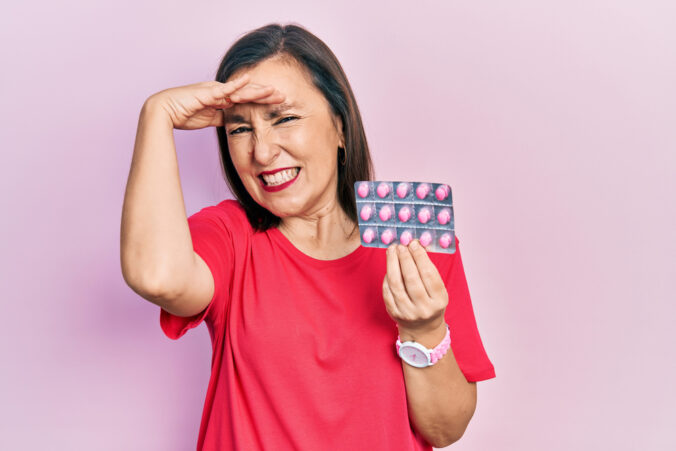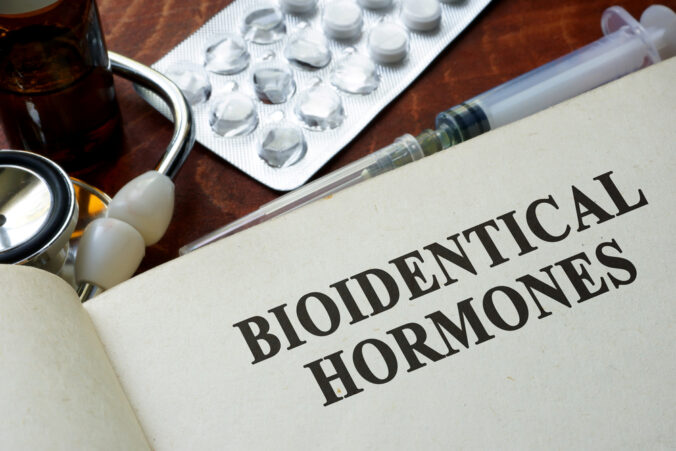Author: Rita Galimberti (Page 2 of 3)
TAKING HRT WILL DELAY MENOPAUSE
Your hormonal replacement therapy will contain the following hormones:
-oestrogen
This is the hormone that will improve your symptoms, help your bone density and reduce your cardiovascular risk.
It can be given to you in different forms: as a tablet, as a patch as a gel.
None of these forms is superior to the other.
There are advantages and disadvantages in any of these preparations and the decision is made on careful evaluation of your risk factors and on your preferences as well.
It is important to note that they all have the same effect and one is no better than the other.
The transdermal form have the advantage of not increasing your risk of thrombosis but this might not be relevant for all patients.
-Progesterone
This is needed when patients have a uterus as it protects the womb. It is also still needed in some patients even if the womb is removed for example if they have endometriosis.
It can be given as tablet or a patch
It can be given for some part of the month or on a daily basis.
This is should all be explained to you at the time of your consultation.
-Testosterone
Can be added to treatment. It is mainly used to treat low libido.
It is important to be aware that some women can have negative effect on mood with testosterone.
It also requires accurate dosing and blood levels should be monitored to ensure you are not exceeding the doses.
Libido issues are common in menopause and they are not all solved by adding testosterone. It is important to have a frank conversation on what sexual issues you are experiencing to be able to give you the right help.
Also your vaginal health is very important. For many women the reduction in libido is due to the fact that sex is uncomfortable because of vaginal atrophy
Improving vaginal atrophy is more important that relaying on testosterone only.
Vaginal laser is a new treatment that has completely revolutionised the way we treat vaginal atrophy.
Chronic vaginal dryness and pain at intercourse is a very common problem in menopause. It is the result of the lack of oestrogens which causes changes in the vaginal mucosa. These changes are reversible using oestrogens (HRT) but not all patients want to use them and some patients might have reached the stage at which oestrogens are not just enough.
Using laser to treat this problem in the vagina is a safe way to turn the clock back and make patients comfortable very quickly.
There are two main types of laser: Co2 laser and Er:Yag laser.
Co2 laser cause some mucosa destruction in order to cause regeneration. There have been some concerns with this treatments in relation to scarring and pain.
The non ablative technology used with Er:Yag laser is very different and that is what I recommned.
It uses a selective thermal action which works in the right tissues and it has not been associated with any problems.
We have used this treatment with success and have been very impressed with the changes that this makes for patients.
for more information visit https://femalase.com/renovalase/
There is a lot of confusion on this issue.
Most of the hormones we use in conventional HRT treatment are identical to what your body will produce . We call them body identical.
However the term bioidentical is used as marketing term by some clinics who use specially compounded preparations . Many claim that these products are better or safer than conventional HRT treatment. Unfortunately these claims are not based on any scientific evidence.
On the contrary these products do not undergo the same checks that conventional products will have to pass in order to be available to patients. That basically means that you have no idea what they contain.
For this reason there are concerns on their safety profile.
They also are far more expensive than conventional HRT as the clinics selling them have a considerable profit margin on the product.
Here is the link to a document produced by the British Menopause society on this issue.
https://thebms.org.uk/publications/consensus-statements/bioidentical-hrt/
Dosages and routes of administration are different for each woman. A full individual assessment is an essential step in prescribing.
During an assessment many factors are taken into consideration:
-age
-risk factors
-severity of symptoms.
The important thing is that current guidelines are very clear on using the lowest dose of HRT that will control your symptoms. Therefore before increasing doses we need to be sure that a symptom is caused by hormonal deficiency and not something else.
It also essential that increasing oestrogen dose is done in parallel to an increased dose of progesterone which is essential to protect the womb from uterine cancer.
The recent trend of prescribing really high doses of oestrogen without any solid evidence has brought the British menopause society to make a statement on the issue:
Read the full statement here:
https://thebms.org.uk/2022/12/bms-statement-hrt-prescribing/
Make sure your medical professional explains all these risks to you when prescribing HRT and your dose is always increased slowly and gradually.
Women affected by menopause symptoms can be very vulnerable. That is why is very easy for marketing companies to target them and offer a vast range of alternative product.
My facebook account is plagued with ads offering the real truth on how to loose weight, sleep and basically solve any problem.
You can spend a lot of money on these products .
Unfortunately there is very little or no scientific evidence on their efficacy.
It is very important that you get proper medical information on menopause as making the wrong choices in the early stages can affect your long term longevity.
VitaminD is probably the only supplement we really need once your diet is good. Look at your diet and at your daily intake of fresh ingredients as your main weapon to age well.
read more on the British Menopause website:
The vast majority of women worries about breast cancer after age 50. While it is important to continue awareness in relation to this disease, it is also important to realise that mortality associated with breast cancer is low and it is not the leading cause of death for women.
The leading cause of death for women is heart disease so if you want to live longer you need to worry more about your heart.
The first thing to do is to assess your risk and doing this is very simple:
- check your family history. Do you have any close relatives in particular your parents who had high blood pressure, diabetes or suffered heart disease?
- check your BMI. Measure your height and your weight and input them in one of the many calculators that you can download from the internet. Your number should be below 25 but you are in more serious trouble if it is over 30.
- check your waist circumference. Using a tape measurement check the circumference around your belly button area. Your number should be below 88 cm.
- check your blood pressure. Many pharmacies offer this check as a free service.
This process is very simple but it is enough to make a good judgement on your situation.If you don’t score well in any of these three things you should make a plan on how to change them and talk to your gp to add a few more tests like sugar and cholesterol levels.
If you have a lot of weight to loose and you have not managed to solve this problem by menopause age you need to come up with an effective solution.
For many women time passes by while we tell ourselves:
“I should eat more healthily”
“I should exercise more”
The bottom line is that no changes happen and you find yourself stuck in the same place.
The first thing for a plan to be effective is to write it down. Decide what you are going to change (usually I suggest to start with diet rather than exercise) and write down a reasonable plan that you are going to review after 30 days.Whatever plan you decide to follow you need accountability and that is why the review in 30 days is essential. Telling yourself that you are doing well is useless if there is no measurable progress.I will write more in future on what I think is the best way to loose weight but you need to start somewhere so make your own choice but set a goal for 30 days later and then reconsider your plan.
After 30 days you need to ask yourself:
Has it worked?
Have you achieved any improvement?
If you haven’t then the diet plan you have picked is not for you. Was it too hard to follow? Was it too vague on quantities and calories?
Whatever the problem was you need to change it. You might at this stage need some expert advice and there are plenty of professional offers out there. Don’t be shy. Very few people can do this alone.
The first thing you need to know is if you are in trouble or not.
A bone assessment should be part of your health assessment especially if you are not planning to take hormonal supplementation. There is no point in waiting until you have had a fracture.
Once you know where you are you can have proper advice on hot to maintain or improve your bone health.
for more information visit the irish osteoporosis website








